- Home
- Various Authors
International Speculative Fiction #4 Page 9
International Speculative Fiction #4 Read online
Page 9
—Alberto Manguel, Black Water: The Anthology of Fantastic Literature
A patient is told by his doctor that he has “Virus 451”, whose sufferers can recall nothing of their lives but have photographic memories of every book they have ever read. An elderly recluse who collects photographs of himself he has taken once a month for years discovers that his image has begun to fade from each photo. The teacher of a freestyle drawing class for autistic children one day plays for his class a recording of Chopin’s Second Piano Concerto, whereupon one of his wards does something impossible for any human to do. Such is everyday life in the worlds of Serbian fantasist Zoran Živković.
Perhaps because his first novel, The Fourth Circle (1993), incorporates devices associated with science fiction (aliens, artificial intelligence, parallel worlds), Živković is often misconstrued as a “science-fiction writer”—a label he aggressively disavows. And rightly so. Živković does not write science fiction. Even when he appropriates science-fictional conceits, he does not use them as SF writers do.
Neither does he write fantasy. His story worlds are not those of faeries—Oz, Narnia, Middle Earth; they are familiar worlds of everyday. Nor does he write horror. The frisson of supernatural fear is as alien to his aesthetic as explicit sex and graphic physical violence.
Živković belongs to no genre. He writes a modern form of the ancient storytelling mode of the fantastic, which he calls “fantastika” and which he elucidates in the interview that appears elsewhere in this issue. Laced with postmodern play, surreal juxtapositions, and (especially) absurdist humor, his stories mix, in varying proportions, the mundane and the Marvelous.
Živković’s fiction issues from the central and eastern European tradition of metaphysical fantasy; in our interview, he numbered among his literary influences Nikolai Gogol, E. T. A. Hoffmann, Mikhail Bulgakov, Stanislaw Lem, Karel Capek, Umberto Eco, and Russian symbolist Valerie Bryusov. In this respect, if in few others, his work follows longstanding trends in Serbian prose.
The supernatural and the mystical have figured prominently in written Serbian literature from the first Christian religious and monastic works of the twelfth century. During the long “Turkish night” of domination by the Ottoman Empire (1478-1878), written literature all but vanished. But fiction and poetry persisted in oral epic poems, legends, folktales, and parables. Following Serbian independence, written literature returned—primarily, realistic accounts of peasant lives in small villages. By the late eighteenth century, however, Serbian proponents of European modernism began to challenge rural realists—first in poetry, then, after World War I, in prose.
By 1948, the year of Živković’s birth, many Serbian writers had moved toward more modern, often experimental forms that included innovative uses of the fantastic. Notwithstanding the continued importance of realists such as 1961 Nobel Laureate Ivo Andri (1892-1975) and regionalists such as Janko Veselinovi (1862-1905), postwar Serbian literature abounds with writers such as Danilo Kiš (1935-89), Milorad Pavi
(1929-2009), and Borislav Peki (1930-92), whose works often combine realism with the fantastic, sometimes using tactics of postmodernism. Anyone wanting an overview of contemporary Serbian fiction should seek out the invaluable anthology The Prince of Fire, edited by Radmila J. Gorup and Nadezda Obradovic (1998).
Even readers familiar with the small fraction of Serbian literature available in translation will find Živković’s work atypical, for it in no way alludes to Serbia, its culture, or its tortured history. His work is largely indeterminate geographically, historically, culturally, politically, even temporally. While many stories contain markers to some time period--computers, horse-drawn carriages, an ancient monastery—very few contain dates or allusions to events that would situate them more precisely.
Živković’s fictions are distinguished by their dreamlike reduction of story to essentials. With a few verbal brushstrokes Živković renders immediate settings so they come alive in our imagination. But that’s all we get. “Compartments” (2004) opens with a man rushing to catch a train about to leave the station. In what city is the station? In what country? What is the train’s destination? Why is he taking this trip? When does the story take place? We’re not told.
As Živković renders setting, so does he render character. About the protagonist of “Compartments” we learn only that he is polite, amiable, and unflappable—traits he will need in order to cope with the bizarre encounters that await him aboard the train. What is his profession, his background, his name? We’re not told because we don’t need to know.
Elision of the extraneous is essential to Živković’s art. His stories’ lack of peripheral context, their spatial and temporal indeterminacy, makes them accessible to any reader, anytime, anywhere. By omitting characters’ nationalities, backgrounds, cultural, political, and social contexts, but vividly rendering their inner lives, Živković connects the personal—meticulously individuated people—to the universal—commonalities his characters share with all humans.
Živković populates his worlds not with superheroes, serial killers, masterminds, or evil villains, but with ordinary, if often eccentric, human beings whose quotidian realities are as familiar as yours or mine. Their immediate environs are city streets, coffee shops, bookshops, antique stores, hospitals, libraries... each vivified with precise details.
True, readers may find it hard to identify with Miss Tamara, a lifelong reader who one day decides, on the basis of no evidence whatsoever, that to read even one sentence in any book in her library will result in her instant death; or with the nameless bibliophile in “Noble Library,” a story in the award-winning The Library (2002), who wages war with a miraculously empowered paperback that, for all his increasingly hysterical efforts, persistently reappears in his fastidiously arranged bookshelf. But anyone can empathize with the middle-aged undertaker in Hidden Camera (2003). A slave to routine and ritual, he daily deals with the dead but never engages the living. His most intimate relationship is with his fish, with whom he shares “nothing more than reciprocated indifference.” Then one day, on impulse, he gives himself over to unseen forces that guide him through a heroic struggle to regain his humanity.
Whether we can identify with Živković’s more neurotic characters, such is his art that we can understand them. They are us writ large. To some degree, their virtues and vices, foibles and faults, afflict us or people we know. Their dilemmas and moral choices are our own.
Unlike most American fantasy, Živković’s stories feature very little action. In each story in Twelve Collections (2007), for example, either a single character ruminates on a collection he has accrued—fingernail clippings, spam emails, other people’s collections—or a character engages in conversation with a collector—one collects hopes; another, deaths (“It’s not as unusual a hobby as it might seem. There are stranger ones.”); another, the final signatures of people about to die. While such stories could descend into tedium, Živković’s don’t. They enter the mind like fleeting, vivid daydreams, then are gone, leaving behind traces of wonder, marvels to ponder.
The engine of his stories is an unbidden intrusion of the impossible, the Marvelous. Some characters encounter impossible beings, others gain access to impossible knowledge, still others undertake impossible journeys. For the fortunate, these incursions open up possibilities for renewal, for re-creation of self. At the heart of their stories—an essential issue in Živković’s work—is how they respond to the Marvelous. Responses range from terror to wonder, from denial to acceptance. The narrator of “Home Library” (2002), for instance, one day finds that a huge book entitled simply World Literature has appeared in his mailbox. Upon its removal, a second volume instantly appears. Then another. Pragmatic to a fault, he becomes immersed in the practicalities of hauling the accumulating volumes, which eventually number 8,305, to his second-story apartment: “In my place somebody else would probably have found many reasons to be surprised by this sudden apparition... I, however, wasn’t surprised
at all... Unusual things should be accepted for what they are, without explanation.”
Živković’s major contribution to the fantastic is the mosaic novel. At first, each such work appears to be a collection of short stories. But as we read, each story interacts with others to generate the thematic richness of a novel. Collections of linked stories are a venerable form—in the United States, Sherwood Anderson’s Winesburg, Ohio (1919); in Colombia, Alvaro Mutis’s The Adventures and Misadventures of Maqroll (1992); in Serbian literature, Danilo Ki’s A Tomb for Boris Davidovich (1976), and so on. But a mosaic novel is something new.
In each, one story alters, often radically, the ground rules of the book’s story world. All the stories thereby gain new dimensions, hitherto inadmissible interpretations. The shift is not arbitrary: its logic and consistency become evident upon reflection and, especially, rereading. But its effect is transformative, epiphanic, vertiginous.
In each of the four stories in Živković’s first mosaic novel, Time Gifts (1997), a mysterious, indistinct figure—who, we are led to believe, may be the devil—visits, respectively, a royal astronomer awaiting execution for heresy, an aging scientist plagued by insecurity about the value of her lifelong study of primeval languages, a watchmaker haunted by the death long ago of his fiancée, and a painter immured in a sanatorium. In the first three, the visitor sends each protagonist on a journey through time that forces them to make life-changing choices. In the fourth, however, Živković shifts profoundly our perspective on this story world (in ways I will not spoil), altering and expanding our understanding of all four tales. The last letter of this last story opens new doors to interpretation.
Živković subsequently refined this form in nine additional mosaic novels. Linkages—how stories interact—become more subtle: rather than a shared character such as the bearer of Time Gifts, stories are linked by, say, patterns of events, recurrent images, or sensory leitmotifs, such as a color in Twelve Collections. The number of interlocking narratives grows, and their interactions become more generative of meaning. By Four Stories Till the End (2004), Živković had developed the mosaic novel into a unique way of imbuing compelling tales with rich philosophical questions.
Živković’s eight other novels share with his mosaic novels an overt concern with narrative form. Typically, he brings the structure of story to the surface, forcing readers to consider form on a par with setting, plot, character, and so on. Živković does this not to play literary games, but to elucidate meaning. In, for example, “The Teashop” (available online at worldliteraturetoday.com), the frame story comments on the intertwined tales each person tells the protagonist, Miss Greta.
Less common in Anglophone than in European literature, this postmodernist propensity for drawing attention to the underlying structure of story is prominent in much contemporary Serbian literature. It is perhaps most familiar in the novels of Milorad Pavi (1929-2009), whose Dictionary of the Khazars (1984), for example, offers three different versions of a lexical history of the Khazar people, versions whose alphabetized entries the author says can be read “in any order the reader desires.”
Živković never goes this far. But starting to read, say, the three stories in The Bridge (2006) feels like entering some crazed literary funhouse where events adhere to no rules whatsoever. Gradually, though, the form of these stories reveals that the world of The Bridge is governed by rules, albeit ones to which we are not privy, and that the book’s essence is embedded in its structure, its artifice, its theatricality. Although filled with absurdities, The Bridge does not deny meaning; rather, it’s like a set of variations on a theme known only to the composer. This propensity attains a kind of apotheosis in the aptly named Escher’s Loops (2008), a novel of four increasingly elaborate sections, each consisting of myriad interconnected stories. Yet, even this, Živković’s most intricate work to date, has a story line attentive readers can follow.
Every new book by Živković is a surprise. In 2007 he published the last thing any of his readers would have expected: a classic detective thriller. In part a worthy homage to Umberto Eco’s The Name of the Rose (1980), The Last Book is as gripping as any murder mystery. Yet although Živković assiduously plays by the rules of the genre, this is no ordinary detective story. He plants sufficient clues for us to solve the mystery, but to do so we must think far outside the box of conventional detective fiction. The final chapter of The Last Book, in which the detective explains (“And what kind of detective story would it be without a resolution to the plot?”), is a tour de force of the imagination. It offers an explanation that is both logically consistent and a startling reversal—one that, in typical Živković fashion, transforms all we have just read, deepening what seemed a conventional thriller into a thought-provoking work of serious literature. The final word of The Last Book provides one of the most emotionally satisfying endings of any novel I know.
Death haunts Živković’s stories—less the event itself than its inexorability and the loss of capacity that accompanies its imminence. Lest this make Živković’s fiction sound drear and heavy, I hasten to add that many of his works are very funny. Even Four Stories Till the End (2004), among his deepest meditations on death, is leavened by laughter.
Fundamentally an optimist, he sees laughter—and love, for him inevitably linked to death—as a balm for the existential despair that is our lot: we are born to die, victims of the implacability of time, the relentlessness of entropy, and the caprices of chance. Laughter offers a possible answer to the metaphysical question that underlies all Živković’s fiction: how can we find fulfillment, let alone joy, in the face of death’s inevitability?
Živković’s works are best read slowly, attentively, in a quiet place—sipped like liqueur, not guzzled like beer. No matter how bizarre a story’s events, his narrative voice never loses its cool: whether describing a park bench on a bright summer’s day or a book that blinds anyone who reads it, his tone remains elegant, unruffled, almost serene. This uniformity of voice heightens the impact of the ruptures of reality that typify his tales. Even a work with very short chapters, such as Twelve Collections, will reward being read over several sessions, between which your mind will begin to make unexpected connections. And if, like me, you come to the last page compelled to return to the first, give in. Živković’s works are eminently rereadable.
The best of his fiction possesses the rare quality Julio Cortazar described as “that fabulous opening-out from the small to the great, from the individual and bounded to the very essence of the human condition.” Živković’s books belong on your shelves next to those by Borges, Calvino, Kafka, and Poe. Not because his fiction is like theirs; Živković is sui generis, a true original. But because he is their literary heir—the finest contemporary practitioner of the art of the literary fantastic.
Norman, Oklahoma
About Michael A. Morrison
Michael A. Morrison is David Ross Boyd Professor Emeritus in the Department of Physics and Astronomy at the University of Oklahoma. A Fellow of the American Physical Society, he has written over one hundred research papers on theoretical atomic and molecular physics, several textbooks on physics, and innumerable book reviews and essays about the literature of the fantastic. He edited and contributed to Trajectories of the Fantastic (1998) and (with Tony Magistrale) A Dark Night’s Dreaming: Contemporary American Gothic Fiction (1997). Recent and forthcoming books include The Joy of Quantum Physics (2012), Low-energy Charged Particles in Atomic and Molecular Gases (with Rob Robson and Ron White; 2013), and Effective Scientific Writing: Recipes and Strategies for Students of Physics and Other Sciences (2013).
Fantastika and the Literature of Serbia: A Conversation with Zoran Živković
Zoran Živković (b. 1948) is the author of nineteen works of fiction. Translations of Živković’s prose books have appeared in more than sixty translated editions. Živković is professor of creative writing at the Faculty of Philology, University of Belgrade. In this interview, the author discus
ses Middle-European “fantastika”, the development of his oeuvre, and his own creative process.
Part I: Fantastika and the literature of Serbia
Michael Morrison: You have allied your fiction with the literary tradition of Middle-European “fantastika”. How do you define this tradition? Which of its authors have influenced your work?
Zoran Živković: The literary and geographical areas of “Mitteleuropa” (“Central Europe”) don’t coincide. The former is much wider, encompassing the European part of Russia. In the nineteenth and part of the twentieth century, it was culturally, intellectually, and artistically rather united, particularly when it comes to literature. Valery Bryusov’s novel The Fiery Angel (1908) is very illustrative in this regard. It is set entirely in sixteenth-century Germany, but if you didn’t know that it was written by a Russian, you could never have guessed it: the novel seems so authentically German.
The term “fantastika”—used in slightly different ways in many European languages—doesn’t seem to have a satisfactory English equivalent. It could have been “fantasy” if that term hadn’t been reduced to a marketing label that means “Tolkienesque” fiction. Fantastika is by no means limited to that narrow section of the spectrum. It is, in fact, the spectrum itself—all nonmimetic prose. Nearly 70 percent of everything written during the past five thousand years is nonmimetic and belongs to one of many forms of fantastika: folklore, oneiric, fairytale, epic, and so forth.
“Middle-European fantastika” was never a literary movement amalgamated by a common poetics. It was, rather, a tradition that shared some traits but was otherwise heterogeneous. Its most common trait was its minimal fantastic content. It features only slight deviations from reality, never large-scale dramatic events. Its protagonists are not heroes, but marginal individuals trying to find their way in a changed world.

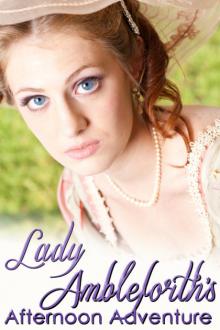 Lady Ambleforth's Afternoon Adventure by Ann Lethbridge, Barbara Monajem, Annie Burrows, Elaine Golden, Julia Justiss and Louise Allen
Lady Ambleforth's Afternoon Adventure by Ann Lethbridge, Barbara Monajem, Annie Burrows, Elaine Golden, Julia Justiss and Louise Allen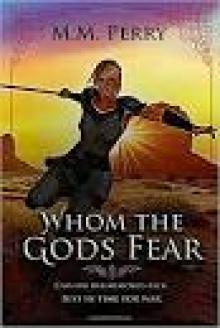 Gods & Mortals
Gods & Mortals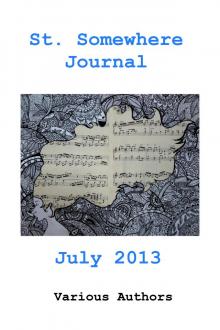 St. Somewhere Journal, July 2013
St. Somewhere Journal, July 2013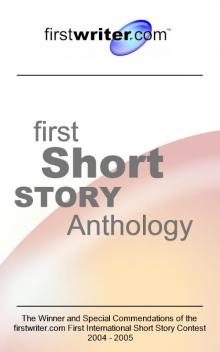 firstwriter.com First Short Story Anthology
firstwriter.com First Short Story Anthology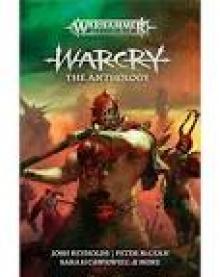 Warcry: The Anthology
Warcry: The Anthology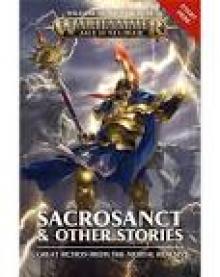 Sacrosanct & Other Stories
Sacrosanct & Other Stories Ultimate Heroes Collection
Ultimate Heroes Collection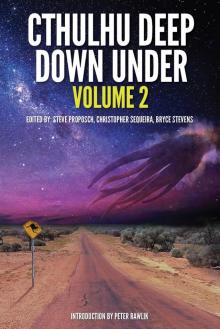 Cthulhu Deep Down Under Volume 2
Cthulhu Deep Down Under Volume 2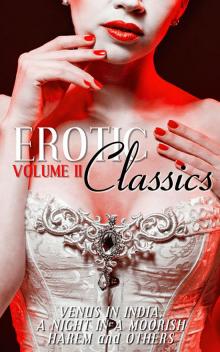 Erotic Classics II
Erotic Classics II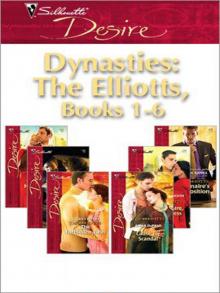 Dynasties: The Elliotts, Books 1-6
Dynasties: The Elliotts, Books 1-6 Dynasties:The Elliots, Books 7-12
Dynasties:The Elliots, Books 7-12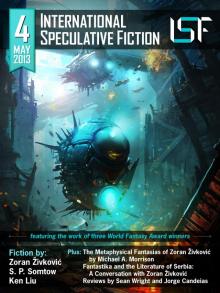 International Speculative Fiction #4
International Speculative Fiction #4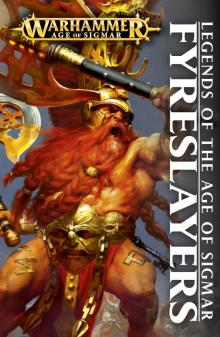 Fyreslayers
Fyreslayers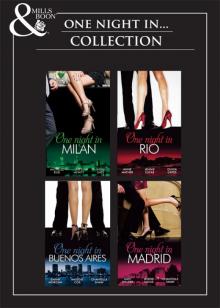 One Night In Collection
One Night In Collection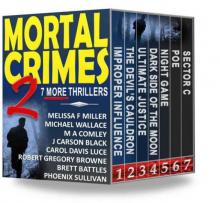 Mortal Crimes 2
Mortal Crimes 2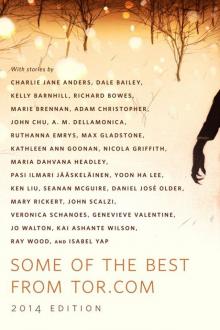 Some of the Best from Tor.com
Some of the Best from Tor.com Howl & Growl: A Paranormal Romance Boxed Set
Howl & Growl: A Paranormal Romance Boxed Set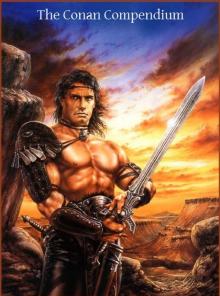 The Conan Compendium
The Conan Compendium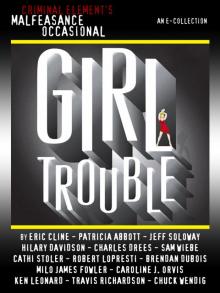 The Malfeasance Occasional
The Malfeasance Occasional Brides of Penhally Bay - Vol 4
Brides of Penhally Bay - Vol 4 Brides of Penhally Bay - Vol 2
Brides of Penhally Bay - Vol 2 Brides of Penhally Bay - Vol 1
Brides of Penhally Bay - Vol 1 School's in Session
School's in Session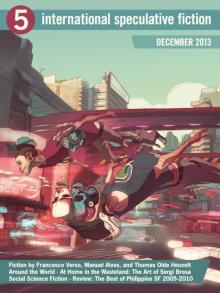 International Speculative Fiction #5
International Speculative Fiction #5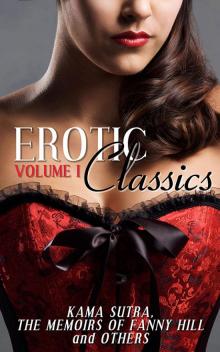 Erotic Classics I
Erotic Classics I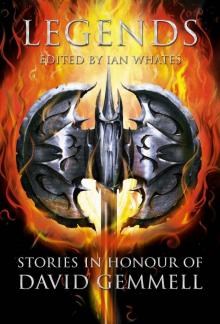 Legends: Stories in Honor of David Gemmell
Legends: Stories in Honor of David Gemmell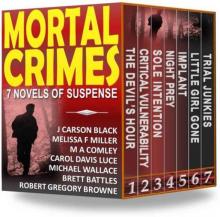 Mortal Crimes 1
Mortal Crimes 1 The Classic Children's Literature Collection: 39 Classic Novels
The Classic Children's Literature Collection: 39 Classic Novels Don't Read in the Closet volume one
Don't Read in the Closet volume one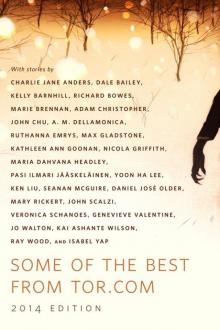 Some of the Best from Tor.com: 2014: A Tor.Com Original
Some of the Best from Tor.com: 2014: A Tor.Com Original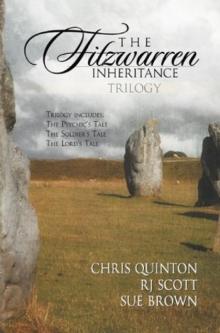 The Fitzwarren Inheritance
The Fitzwarren Inheritance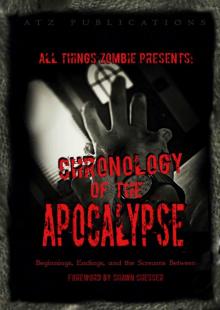 All Things Zombie: Chronology of the Apocalypse
All Things Zombie: Chronology of the Apocalypse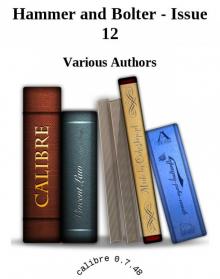 Hammer and Bolter - Issue 12
Hammer and Bolter - Issue 12 Kiss Kiss
Kiss Kiss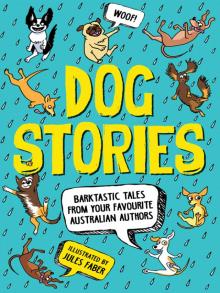 Dog Stories
Dog Stories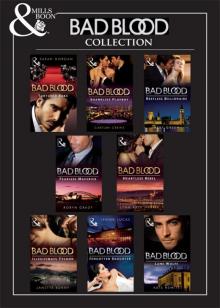 Bad Blood Collection
Bad Blood Collection